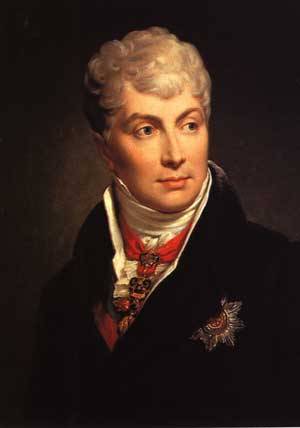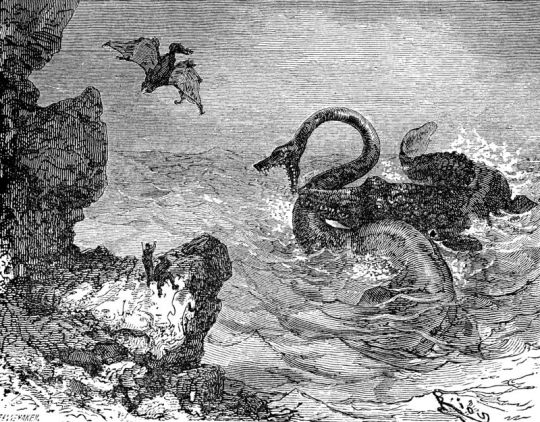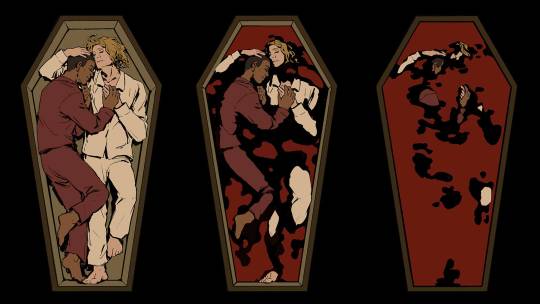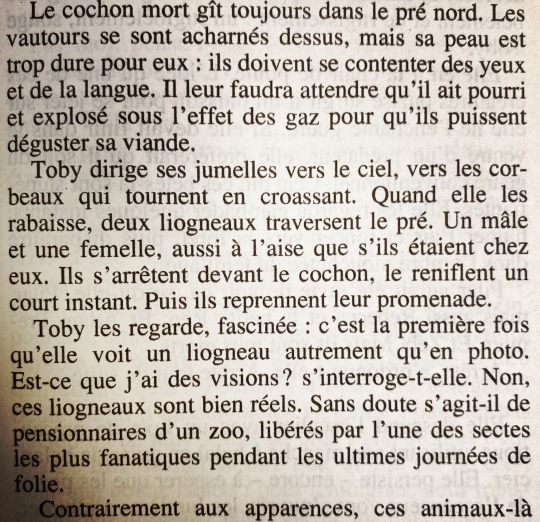#Le déluge
Explore tagged Tumblr posts
Text

Léon Comerre - Le déluge (1911)
11 notes
·
View notes
Text
Avant première du film « Le Déluge » en présence de Guillaume Canet.
J’avais dans ma mémoire cinématographique l’image de Louis XVI par Jean François Balmer, dorénavant je penserai aussi à Guillaume Canet.
Un film pesant et difficile psychologiquement sur la dernière année de la famille Capet emprisonnée à la tour du temple.
Une très belle photographie, presque des peintures, un plan séquence mémorable avec le bourreau Samson, une Mélanie Laurent très digne en Marie Antoinette, bref une réussite.



1 note
·
View note
Text
youtube
LE DÉLUGE - Bande-annonce
1792, L���Ancien Régime touche à sa fin. À Paris, Louis XVI et son épouse Marie-Antoinette sont arrêtés et conduits au donjon de la Tour du Temple. Librement inspiré des carnets de Cléry, valet de chambre du Roi resté auprès de lui jusqu’à sa mort.
1 note
·
View note
Video
Krampus visite les Salles Occultes du Metropolitain Museum par The Parks Via Flickr : Everyone knows the Metropolitan Museum in New York and the MET Gala that takes place there every year... But, what the World ignores, is that there is a hidden passage, leading to occult rooms where Gods and extraterrestrial entities, collect works of terrestrial Arts. So we see in the photo, taken by Freudon, Krampus admiring the Flood by Anne-Louis Girodet, or perhaps, the statue of Bloody Raid-Red, from the giant chess game produced by the dwarves ...
#Krampus#Metropolitan#Museum#le Déluge#Anne-Louis Girodet#New York#MET#GALA#webcomic#webtoon#Illustration#fantasy#SF#BD#flickr
0 notes
Link
Filming concluded last week on The Flood (Le Déluge), a film written and directed by Gianluca Jodice (director of The Bad Poet [+]) which centres on the final days of Louis XVI and Marie Antoinette before their execution. The film, an Italian-French co-production, stars Guillaume Canet (seen recently in Astérix & Obélix: The Middle Kingdom [+], which he also directed) in the role of the last French monarch, and Mélanie Laurent (seen recently in The Mad Women's Ball [+], which she also directed, and in Ride Above [+]) in that of his wife, and presents itself as an apocalyptic film in the most literal sense of the word: that of revelation.
1 note
·
View note
Text

happy thanksgiving time to reblog all of my arcane posts
3 notes
·
View notes
Text
Summary: Noé kills Vanitas. The Mark refused it, and wiped Vanitas' memories of Noé completely instead. Set a year after canon.
Author: @shayvanbrn
#official fic poll#haveyoureadthisfic#pollblr#fanfiction#fandom culture#internet culture#fanfic#fandom poll#tumblr polls#après moi le déluge#vanitas no shuki#vnc#vanoe#ao3
4 notes
·
View notes
Text

Déluge - Æther (Les Acteurs De L'Ombre Productions, 2016)
youtube
1 note
·
View note
Text

mais ma parole ils se permettaient vraiment de dire n'importe quoi avant 😭
#je suppose que pour eux c'était les arts préhistoriques ???#french#le déluge... vraiment nawak quoi#upthebaguette#french side of tumblr#bee tries to talk
1 note
·
View note
Text
Les belles expressions de la langue française : Après moi le déluge !
« Après moi le déluge » autrement dit après ma mort débrouillez-vous, je n’en ai rien à fiche ! Belle marque d’indifférence pour les proches et les amis, n’est-il pas ? Autrement dit, peu importe ce qui va arriver, même si c’est une catastrophe ! Certains attribuent ces mots à Louis XV qui, pressentant la fin de la monarchie, se serait exprimé ainsi pour faire savoir qu’il se moquait de ce que…

View On WordPress
0 notes
Note
I would LOVE to hear more gripes about accuracy of portrayal of historical monarchies!!!
I have been wanting to do this for a while, because there is a lot that irks me. And this ranges across board from big budget period dramas to how people write royalty AUs, which means this isn't one specific thing I'm pointing at. And if it is helpful on a writing tips level, I'll be happy with that.
Long post under the cut:
Disclaimers:
I research 19th century European history, which has a lot of questions about what a monarchy is and why they continue to exist. That's the perspective I am bringing to this.
I probably shouldn't have to say this, but: this is not about modern monarchism. This is about history. I don't want to debate whether you think certain countries should continue to have their monarchs be public figures who are only nominally head of state.
The short version:
Monarchies are institutions. They are part of how the government functions and that should have implications for how someone writes them. A monarch is a person with a built in job that they were born into.
Monarchies are not all absolute. They can exist in a multiple forms with very different structures, and often discontent within a monarchy wants to reform the system not replace it.
My biggest advice would be this: figure out how your fictional or historical monarchy is structured. You don't have to exposit about it, but you do need to know it.
The long version:
The King has a job and there is a right and wrong way to do it.
Fantasy monarchies that draw upon history seem to have Versailles in mind in terms of an aesthetic space and royalty with a lot of power over the people around them. This also includes a lot of lounging around and looking pretty and doing lavish things. However, the issue is that this is a mental image of the dysfunction in the French monarchy close to the revolutions. You can't "Après moi, le déluge" through several centuries of government.
A King (or Queen) has a job, a really important one. They are the head of state, the highest authority in the country, and the highest judge on legal matters. At least in the platonic ideal of absolute monarchy, those jobs being concentrated into one person means their responsibility and good judgement will give the state stability and consistently.
Enlightened absolutism was exactly that: monarchs staunchly holding onto the ideals of the Enlightenment and making reforms from the top down. People who read texts about ideal government and natural rights and put it into practice.
A lot of fiction takes that and goes: Oh, so they have unlimited power and can do whatever they want. Being king means you can do what you want without oversight? That's why someone would want to be king?
And yeah, sure, in theory. But the problem with having a job is that you can do it poorly and people will object to you doing it poorly. If someone is not fulfilling obligations, it is noticeable because the state functions poorly. The premise of Robin Hood is that the king is doing his job poorly. He's overtaxing, the officials are corrupt, there's disorder. The solution? Bring back the true king who is good and fair, and thus functional.
Ludwig II of Bavaria gets ousted from his throne for being more interested in opera and extravagant building projects than ruling. Again, it is a problem and people notice.
Historically, if you want to protect from someone being bad at the job you can support the idea that there should be more oversight and safeguards: Other bodies that control parts of the government alongside the king's ability to approve or disapprove. This tactic takes away the ability to be arbitrary since laws and such are not just coming from the crowned head of state. That would be a constitutional monarchy.
Not everyone needs to be Franz Joseph, waking up at the crack of dawn and working on governmental papers and meetings until bedtime. However, if a monarch is shown in fiction lounging around or talking to courtiers all day but never doing any actual governing, I'm going to assume they are very bad at their job.
2. You're probably understanding Courts and Ministers wrong.
I run into the issue quite a bit that courts are flattened to random servants, ladies-in-waiting, and people trying to be the king's sole advisor (for malicious power grabbing reasons).
The first problem: Being at court isn't an easily accessible thing. You're probably nobility or a scion of an important family. Your presence is built on family prestige and your own skill. Yes, even people in service to the monarch. There are no random people here, because proximity heightens the likelihood of greater promotion.
For example, I'm currently doing my research on a prince from an important dynasty in the 19th century. His secretary is a Baron.
It's not impossible for someone not of noble birth to get to be at court. They could have risen up the ranks of the army or be an exceptionally skilled civil servant promoted to the rank of minister. Though depending on the time period, expect these "new men" to get pushback from nobility by blood.
Ministers also matter.
Unless your fictional monarch is one of the few people who decides (to mixed results) to do all of the thinking about government on their own, there is a cabinet and ministers.
These are skilled people whose job is to think about aspects of government and be knowledgeable about them. A monarch might have many of them that argue and balance each other.
Or, you can write a particularly skilled statesman in a leading role that makes them just as prominent as the monarch if not more so. There are many historical examples of ministers who define their period:



If your monarch character isn't a strong person politically, but is intelligent, having them find a minister to take over most of the governing is a good idea. This person is promoted based on merit, even if the monarchy is hereditary.
I have rarely if ever seen fiction do a good job with a prominent minister as a character (except A Royal Affair, which everyone should watch).
Think of monarchies as whole institutions of government. They have people within them who do all the jobs of governing. But the structure of the government and the personality of the monarch can determine whether it is one person (Joseph II, Peter the Great, etc.), a prominent minister (like a Metternich or Bismarck) or a counsel or congress.
The structure can support a person not doing a lot as monarch, but you as a writer need to think what structures are around them allowing that.
3. Revolutions are scary.
There is a common trend in fiction to make your good guys pro-republic. They're revolutionaries who want to get rid of the king, so they must be good.
But here's the thing: Revolutions are a step into the unknown and have historically happened rather rarely and with very mixed results. That's because the system has to be really broken for something totally new to sound better than what you already have.
A monarchy can create a sense of stability: A fixed head of state who will be there until they die. Historically, people aren't seeking to change that. More often, the call is for a change within the existing structure. The Magna Carta or a written Constitution. Firing of Bad Ministers or the abdication of a bad king in favor of their heir. Creating elected bodies under the sovereign. These are all shifting the monarchical paradigm but keeping the monarchy intact.
And historically even the most liberal of people wanted to place restrictions of some sort on voting, especially property and gender restrictions.
There is a myriad of ways to change the system, the person at the top, or both while maintaining a monarchy. You can have a monarchy be elected as the best person among the nobility (though it didn't go that well for the Polish-Lithuanian Commonwealth).
Completely throwing the whole thing out means risking all stability vanishing. That could be anarchy. That could mean a charismatic strongman who is also bad at governing in power. You could end up with a guillotine and rivers of blood in the streets. You could end up with a restoration eventually because Cromwell or Robespierre doesn't actually produce something people want to live under and they want the old certainty back.
People have a sense of inertia about changing government. What you have is better than what you don't know, especially if there can be internal reform. Making your character a Republican (in the Jacobin sense, not the US politics sense) means that they are a radical in most times and places and will likely be in the minority.
If there is one thing I would say is the point here is that monarchies are government systems, and thinking through how someone exists in that system in fiction is important. Being king isn't actually much of a fun job unless you're very good at delegating or very irresponsible. Unless you want to be celebrity, president, congress, and moral center of the state all in one, being king isn't a great deal.
512 notes
·
View notes
Text

Illustration of an ichthyosaur encountering a plesiosaur, from Figuier's La Terre Avant le Déluge (1865).
This image by Édouard Riou was impressive enough that it inspired the battle between the ichthyosaur and the plesiosaur in Jules Verne's Voyage Au Centre de la Terre (Journey to the Center of the Earth) (1867).
Better still, Édouard Riou did the art for that book.
And best of all, he drew the battle twice, once for the frontispiece and once for the actual part in the book.


They don't really do much in the book besides pop out of the water, startle our protagonists, and rip each other to shreds, but it's one of JTTCOTE's most iconic moments. Wouldn't you want to witness a battle to the death between antediluvian marine titans on a vast sea in the center of the earth?
306 notes
·
View notes
Text

Après moi, le déluge
After me comes the flood
#if you saw the Rilakkuma jammies version on Twitter that is not a lie ;u;#its gonna happen I'm getting to it the angst just has to eat first#interview with the vampire#iwtv#loustat#louis de pointe du lac#lestat de lioncourt#alibonbonn#alidraws
6K notes
·
View notes
Text

@sunlaid * i believe in second chances, i don’t believe in third chances.

[...] " You're far more merciful than I, my liege, " a gold coin rubbed between forefinger and thumb, her instrument of luck and scratched with nervous markings. " to be made a fool, thrice. "

#⤷ * sunlaid.̲.̲.#⤷ * frey‚ yelena.̲.̲. après moi‚ le déluge / after me comes the flood‚#⤷ * event.̲.̲.#muse roulette
0 notes
Text

Fossils of fish fins, showing their evolution. La terre avant le déluge. 1874.
Internet Archive
976 notes
·
View notes
